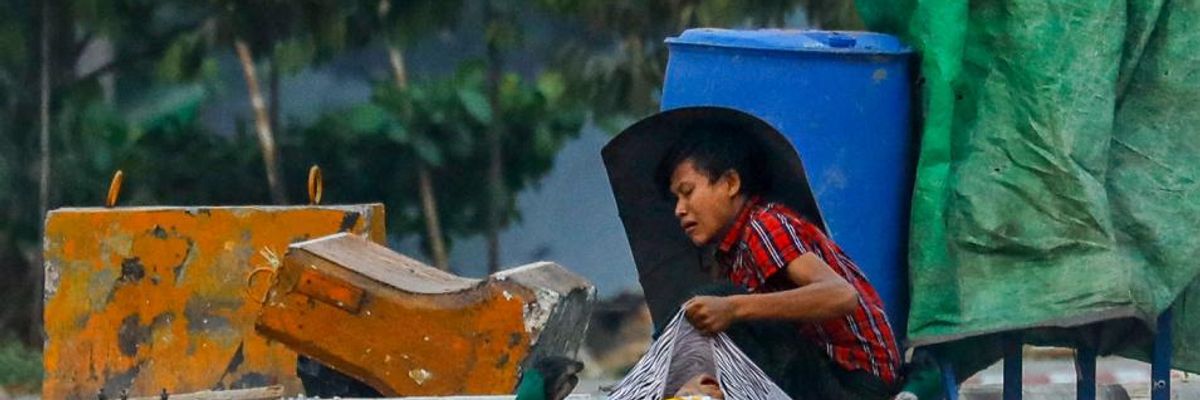Sunday marked the deadliest day of anti-coup demonstrations in Myanmar since the country's military seized power on February 1, and after security forces opened fire on protesters this weekend--killing at least 51 people, with most casualties reported in the city of Yangon--the widely condemned ruling junta has extended the geographic reach of its martial law order.
New York Times foreign correspondent Richard Paddock described the military's intensification of violence against pro-democracy protesters this past weekend:
Despite weeks of killings by the security forces, a nationwide civil disobedience movement--which has paralyzed much of the economy as well as the government's operations--shows no sign of waning...
Late Sunday afternoon, another wave of killing began in the Hlaingthaya district of Yangon, which is heavily populated by factory workers and where the protests against military rule have been among the most aggressive. A large force of soldiers and police officers was deployed to the township and fatally shot at least 31 protesters, according to a doctor at Hlaingthaya General Hospital. It was the highest daily death toll in one location since the coup.
On Sunday evening, the ruling junta declared martial law in the district--the first such declaration since the takeover--allowing the military to assume all authority in the township from the police.
As BBC News reported Monday: "The military initially declared martial law in two districts of Yangon, the country's largest city, on Sunday after Chinese businesses were attacked. Martial law was imposed in several other areas of Yangon and Mandalay on Monday. Protesters there can now be tried in military courts."
Myanmar's troops and police have responded to the country's wave of nonviolent protests with an increasingly deadly crackdown on pro-democracy demonstrators who are demanding a return to civilian rule and the release of all imprisoned government officials.
According to the Assistance Association for Political Prisoners, more than 125 people have been killed, hundreds more wounded, and over 1,830 arbitrarily detained in Myanmar since last month, amid the junta's increasingly violent repression of widespread street protests that erupted after the country's top general, Min Aung Hlaing, seized power.
While ousted civilian leader Aung San Suu Kyi of the National League for Democracy (NLD) party has in recent years faced intense global criticism for her alleged complicity in the military's genocidal assault on Myanmar's Rohingya Muslim minority, hundreds of thousands of people throughout the Southeast Asian country have made it clear that they oppose her detention and want to be governed by elected officials, not the armed forces.
The NLD enjoyed a landslide victory in parliamentary elections last November, but most of the party leadership was arrested after the coup, which the military justified with unsubstantiated allegations of voter fraud.
Suu Kyi "has been held at an unknown location since the February 1 coup," BBC News reported. "She is due to face a slew of charges her supporters say are fabricated. On Monday, she was due to appear in court, but the virtual hearing was adjourned due to internet problems."
Some of the displaced members of parliament "have refused to accept last month's coup and have gone into hiding, forming a new group, the CRPH, or Committee for Representing the Union Parliament," the news outlet noted. Mahn Win Khaing Than, a member of the deposed NLD and leader of the committee, "urged protesters over the weekend to defend themselves against the military crackdown during what he called a 'revolution'... adding: 'the uprising must win.'"
The Associated Pressreported on Khaing Than's first public address since the coup:
"This is the darkest moment of the nation and the moment that the dawn is close," he said in a video posted on the shadow government's website and social media.
"In order to form a federal democracy, which all ethnic brothers who have been suffering various kinds of oppressions from the dictatorship for decades really desired, this revolution is the chance for us to put our efforts together," he said.
He added: "We will never give up to an unjust military, but we will carve our future together with our united power. Our mission must be accomplished."
At the end of the message, he flashed the three-finger salute that has become a symbol of resistance to the military rulers.
BBC News noted that "the military considers the CRPH illegal, warning that anyone cooperating with them will face treason charges."
According to AP, the actual death toll of pro-democracy protesters in Myanmar is "likely higher, as police apparently seized some bodies, and some victims have had serious gunshot wounds that medical staff at makeshift clinics would be hard-pressed to treat. Many hospitals are occupied by security forces, and as a result are boycotted by medical personnel and shunned by protesters."
"Police have also aggressively patrolled residential neighborhoods at night, firing into the air and setting off stun grenades as an intimidation tactic," the news outlet added. "They have also taken people from their homes in targeted raids with minimal resistance. In at least two known cases, the detainees died in custody within hours of being hauled away."
Zaw Myat Lynn, a well-known community organizer, teacher, and activist in the NLD, is one of the individuals who was arrested and tortured to death, The Guardianreported Monday.
The ruling junta's escalation of violence against pro-democracy protesters this past weekend comes after United Nations special rapporteur Tom Andrews warned that Myanmar's military regime had likely committed "crimes against humanity," as Common Dreams reported last week.
In the Times, Paddock wrote that "the ruling generals' current strategy, it appears, is to wear down the populace with daily killings and arbitrary violence, calculating that people will abandon their hopes for democracy if enough of them are slaughtered, beaten, and arrested."
"But so far," he added, "the bloodshed has only solidified the resistance."
Andrews, for his part, urged U.N. member states to heed his call to cut off the Myanmar military's access to cash and weapons.

